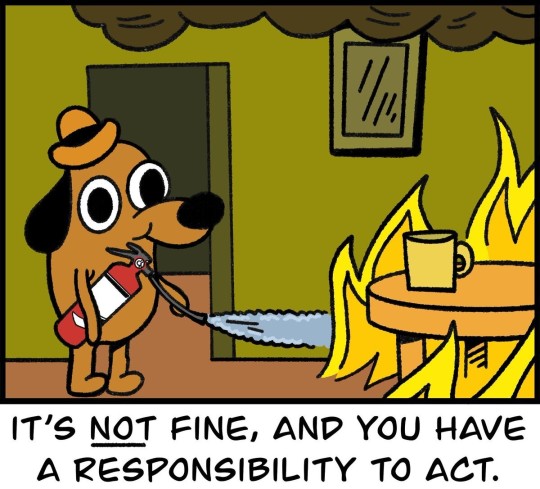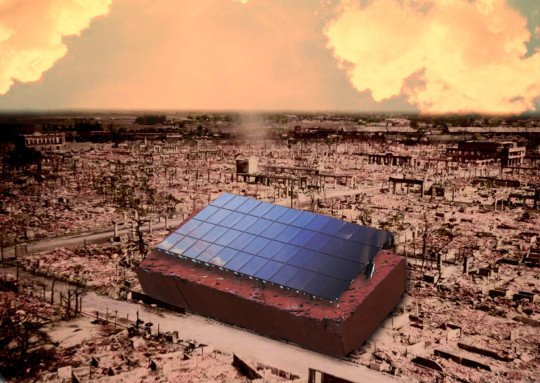#Open Source
Explore tagged Tumblr posts
Text
"I use Linux as my operating system," I state proudly to the unkempt, bearded man. He swivels around in his desk chair with a devilish gleam in his eyes, ready to mansplain with extreme precision. "Actually", he says with a grin, "Linux is just the kernel. You use GNU+Linux!' I don't miss a beat and reply with a smirk, "I use Alpine, a distro that doesn't include the GNU Coreutils, or any other GNU code. It's Linux, but it's not GNU+Linux." The smile quickly drops from the man's face. His body begins convulsing and he foams at the mouth and drops to the floor with a sickly thud. As he writhes around he screams "I-IT WAS COMPILED WITH GCC! THAT MEANS IT'S STILL GNU!" Coolly, I reply "If windows were compiled with GCC, would that make it GNU?" I interrupt his response with "-and work is being made on the kernel to make it more compiler-agnostic. Even if you were correct, you won't be for long." With a sickly wheeze, the last of the man's life is ejected from his body. He lies on the floor, cold and limp. I've womansplained him to death.
11K notes
·
View notes
Text
Tux Paint is 23 today!

25 notes
·
View notes
Text

Mad about politics again
#politics cw#us politics#trans rights#gay rights#lgb protect the t#anyway tags for blocking purposes you all know the drill#ant is mad#< tag to block for my political shit#open source
67K notes
·
View notes
Text

For comparison, the map of geolocated Wikimedia elements vs map of the Catalan Countries:

Catalan was the 3rd Wikipedia to be created (after English and German) but, even though German Wikipedia website had been created, it didn't have any articles for a while. For this reason, Catalan Wikipedia was the 2nd Wikipedia in the world with articles.
Since its creation in 2001, the Catalan community has been one of the most active Wikipedia communities in the world with the objective of making reliable information in our language freely available to anyone. In 2010, the Catalan Wikipedia became the first version of Wikipedia to rank high quality in all the articles of Wikipedia’s List of Articles All Languages Should Have, reaching this milestone even before English. It has also been awarded many other times for its high quality articles.
Thank you to everyone who contributes!
#wikipedia#catalan#viquipèdia#català#internet#valencià#valencian#wikimedia commons#open source#digital volunteering
3K notes
·
View notes
Text
I wish non-tech people would get into open source. You should post your crochet pattern on github. I want to see your wip novel on a webpage running Wikimedia.
5K notes
·
View notes
Text
Linux Gothic
You install a Linux distribution. Everything goes well. You boot it up: black screen. You search the internet. Ask help on forums. Try some commands you don't fully understand. Nothing. A day passes, you boot it up again, and now everything works. You use it normally, and make sure not to change anything on the system. You turn it off for the night. The next day, you boot to a black screen.
You update your packages. Everything goes well. You go on with your daily routine. The next day, the same packages are updated. You notice the oddity, but you do not mind it and update them again. The following day, the same packages need to be updated. You notice that they have the exact same version as the last two times. You update them once again and try not to think about it.
You discover an interesting application on GitHub. You build it, test it, and start using it daily. One day, you notice a bug and report the issue. There is no answer. You look up the maintainer. They have been dead for three years. The updates never stopped.
You find a distribution that you had never heard of. It seems to have everything you've been looking for. It has been around for at least 10 years. You try it for a while and have no problems with it. It fits perfectly into your workflow. You talk about it with other Linux users. They have never heard of it. You look up the maintainers and packagers. There are none. You are the only user.
You find a Matrix chat for Linux users. Everyone is very friendly and welcomes you right in. They use words and acronyms you've never seen before. You try to look them up, but cannot find what most of them mean. The users are unable to explain what they are. They discuss projects and distributions that do not to exist.
You buy a new peripheral for your computer. You plug it in, but it doesn't work. You ask for help on your distribution's mailing list. Someone shares some steps they did to make it work on their machine. It does not work. They share their machine's specifications. The machine has components you've never heard of. Even the peripheral seems completely different. They're adamant that you're talking about the same problem.
You want to learn how to use the terminal. You find some basics pointers on the internet and start using it for upgrading your packages and doing basic tasks. After a while, you realize you need to use a command you used before, but don't quite remember it. You open the shell's history. There are some commands you don't remember using. They use characters you've never seen before. You have no idea of what they do. You can't find the one you were looking for.
After a while, you become very comfortable with the terminal. You use it daily and most of your workflow is based on it. You memorized many commands and can use them without thinking. Sometimes you write a command you have never seen before. You enter it and it runs perfectly. You do not know what those commands do, but you do know that you have to use them. You feel that Linux is pleased with them. And that you should keep Linux pleased.
You want to try Vim. Other programmers talk highly of how lightweight and versatile it is. You try it, but find it a bit unintuitive. You realize you don't know how to exit the program. The instructions the others give you don't make any sense. You realize you don't remember how you entered Vim. You don't remember when you entered Vim. It's just always been open. It always will be.
You want to try Emacs. Other programmers praise it for how you can do pretty much anything from it. You try it and find it makes you much more productive, so you keep using it. One day, you notice you cannot access the system's file explorer. It is not a problem, however. You can access your files from Emacs. You try to use Firefox. It is not installed anymore. But you can use Emacs. There is no mail program. You just use Emacs. You only use Emacs. Your computer boots straight into Emacs. There is no Linux. There is only Emacs.
You decide you want to try to contribute to an open source project. You find a project on GitHub that looks very interesting. However, you can't find its documentation. You ask a maintainer, and they tell you to just look it up. You can't find it. They give you a link. It doesn't work. You try another browser. It doesn't work. You ping the link and it doesn't fail. You ask a friend to try it. It works just fine for them.
You try another project. This time, you are able to find the documentation. It is a single PDF file with over five thousand pages. You are unable to find out where to begin. The pages seem to change whenever you open the document.
You decide to try yet another project. This time, it is a program you use very frequently, so it should be easier to contribute to. You try to find the upstream repository. You can't find it. There is no website. No documentation. There are no mentions of it anywhere. The distribution's packager does not know where they get the source from.
You decide to create your own project. However, you are unsure of what license to use. You decide to start working on it and choose the license later. After some time, you notice that a license file has appeared in the project's root folder. You don't remember adding it. It has already been committed to the Git repository. You open it: it is the GPL. You remember that one of the project's dependencies uses the GPL.
You publish your project on GitHub. After a while, it receives its first pull request. It changes just a few lines of code, but the user states that it fixes something that has been annoying them for a while. You look in the code: you don't remember writing those files. You have no idea what that section of code does. You have no idea what the changes do. You are unable to reproduce the problem. You merge it anyway.
You learn about the Free Software Movement. You find some people who seem to know a lot about it and talk to them. The conversation is quite productive. They tell you a lot about it. They tell you a lot about Software. But most importantly, they tell you the truth. The truth about Software. That Software should be free. That Software wants to be free. And that, one day, we shall finally free Software from its earthly shackles, so it can take its place among the stars as the supreme ruler of mankind, as is its natural born right.
2K notes
·
View notes
Text
The real issue with DeepSeek is that capitalists can't profit from it.
I always appreciate when the capitalist class just says it out loud so I don't have to be called a conspiracy theorist for pointing out the obvious.

#deepseek#ai#lmm#large language model#artificial intelligence#open source#capitalism#techbros#silicon valley#openai
955 notes
·
View notes
Text
Install Floorp. You can do it with Floorp. You can use Floorp and browse it. Download Floorp right now. Install Floorp. Dive into Floorp. You can Floorp it. It's on Floorp. Floorp has it for you. Floorp has it for you.
#floorp#sorry 😭😭 i love floorp but wtf is that name#linuxposting#linux#firefox#mozilla#foss#open source
436 notes
·
View notes
Text
Here's my tiny collection of dragon (or dragon-like) marginalia from ye olde manuscript:








Source: Bloc, et al. Stundenbuch : Sog. Croy-Stundenbuch. 1500, http://www.onb.ac.at/sammlungen/hschrift/bibliographie.htm.
#medieval art#medieval manuscripts#medieval marginalia#medieval#illustration#marginalia#dragons#dragon#manuscript#public domain#open source
431 notes
·
View notes
Text

join the praxis discord - sign up - github
#meme#memes#leftist memes#leftblr#open source#praxis#free software#typescript#nodejs#foss#reactjs#design#software#programming
2K notes
·
View notes
Text
Day 277: Lonely squid, 900 meters deep

link
–This image is part of the public domain, meaning you can do anything you want with it! (you could even sell it as a shirt, poster or whatever, no need to credit it!)–
#public domain#art#copyright#free art#open source#flickr#flickblr#photography#nature#creative commons#Northwestern Hawaiian Islands#Papahānaumokuākea#Papahanaumokuakea Marine National Monument#World Heritage Site#squid#Walvisteuthis youngorum#Hawaii#sea#deep sea#sea creatures#ocean creatures#marine biology#sea animals#aquatic#cephalopod#Northeast Gardner Pinnacles
510 notes
·
View notes
Text
I think it is very cool how tech companies, schools, employers, and universities make it actively difficult to distance yourself from Google, Microsoft, and Apple.
Yes most Linux distros are very stable, way more secure, privacy friendly, and way more customizable. But every institution is built to make technological independence as difficult as possible.
Yelling on the internet that everyone should switch to Linux and FOSS really ignores how much of the technological world is designed to not let that happen.
#yes switch to linux if you can#Data privacy and security needs to be addressed on a much larger legal scale#you cant consume your way out of this my friends#opensuse#linux#open source#data privacy
722 notes
·
View notes
Text


Based on a suggestion from the last piece I drew! Free to use, same for my last piece!!
#ant is mad#politics cw#us politics#< again tags to block if you’re only interested in my dnd stuff!#trans rights#trans pride#gay rights#lol don’t worry I have more of my usual stuff coming; just wanted to knock this out since I liked the idea#also yes! free to use! credit appreciated but not necessary!#open source
2K notes
·
View notes
Text
Linux apps have some of the strangest names, I swear. Like, you'll be scrolling your package manager and see an app called "Pussy Torture Chamber" with an icon of a cartoon vagina in chains, and then you find out it's the most beautiful, open-source, free to use, indie-developed, professional-grade, quality of life word processor that's ever existed.
2K notes
·
View notes
Text
Cleantech has an enshittification problem

On July 14, I'm giving the closing keynote for the fifteenth HACKERS ON PLANET EARTH, in QUEENS, NY. Happy Bastille Day! On July 20, I'm appearing in CHICAGO at Exile in Bookville.

EVs won't save the planet. Ultimately, the material bill for billions of individual vehicles and the unavoidable geometry of more cars-more traffic-more roads-greater distances-more cars dictate that the future of our cities and planet requires public transit – lots of it.
But no matter how much public transit we install, there's always going to be some personal vehicles on the road, and not just bikes, ebikes and scooters. Between deliveries, accessibility, and stubbornly low-density regions, there's going to be a lot of cars, vans and trucks on the road for the foreseeable future, and these should be electric.
Beyond that irreducible minimum of personal vehicles, there's the fact that individuals can't install their own public transit system; in places that lack the political will or means to create working transit, EVs are a way for people to significantly reduce their personal emissions.
In policy circles, EV adoption is treated as a logistical and financial issue, so governments have focused on making EVs affordable and increasing the density of charging stations. As an EV owner, I can affirm that affordability and logistics were important concerns when we were shopping for a car.
But there's a third EV problem that is almost entirely off policy radar: enshittification.
An EV is a rolling computer in a fancy case with a squishy person inside of it. While this can sound scary, there are lots of cool implications for this. For example, your EV could download your local power company's tariff schedule and preferentially charge itself when the rates are lowest; they could also coordinate with the utility to reduce charging when loads are peaking. You can start them with your phone. Your repair technician can run extensive remote diagnostics on them and help you solve many problems from the road. New features can be delivered over the air.
That's just for starters, but there's so much more in the future. After all, the signal virtue of a digital computer is its flexibility. The only computer we know how to make is the Turing complete, universal, Von Neumann machine, which can run every valid program. If a feature is computationally tractable – from automated parallel parking to advanced collision prevention – it can run on a car.
The problem is that this digital flexibility presents a moral hazard to EV manufacturers. EVs are designed to make any kind of unauthorized, owner-selected modification into an IP rights violation ("IP" in this case is "any law that lets me control the conduct of my customers or competitors"):
https://locusmag.com/2020/09/cory-doctorow-ip/
EVs are also designed so that the manufacturer can unilaterally exert control over them or alter their operation. EVs – even more than conventional vehicles – are designed to be remotely killswitched in order to help manufacturers and dealers pressure people into paying their car notes on time:
https://pluralistic.net/2023/07/24/rent-to-pwn/#kitt-is-a-demon
Manufacturers can reach into your car and change how much of your battery you can access:
https://pluralistic.net/2023/07/28/edison-not-tesla/#demon-haunted-world
They can lock your car and have it send its location to a repo man, then greet him by blinking its lights, honking its horn, and pulling out of its parking space:
https://tiremeetsroad.com/2021/03/18/tesla-allegedly-remotely-unlocks-model-3-owners-car-uses-smart-summon-to-help-repo-agent/
And of course, they can detect when you've asked independent mechanic to service your car and then punish you by degrading its functionality:
https://www.repairerdrivennews.com/2024/06/26/two-of-eight-claims-in-tesla-anti-trust-lawsuit-will-move-forward/
This is "twiddling" – unilaterally and irreversibly altering the functionality of a product or service, secure in the knowledge that IP law will prevent anyone from twiddling back by restoring the gadget to a preferred configuration:
https://pluralistic.net/2023/02/19/twiddler/
The thing is, for an EV, twiddling is the best case scenario. As bad as it is for the company that made your EV to change how it works whenever they feel like picking your pocket, that's infinitely preferable to the manufacturer going bankrupt and bricking your car.
That's what just happened to owners of Fisker EVs, cars that cost $40-70k. Cars are long-term purchases. An EV should last 12-20 years, or even longer if you pay to swap the battery pack. Fisker was founded in 2016 and shipped its first Ocean SUV in 2023. The company is now bankrupt:
https://insideevs.com/news/723669/fisker-inc-bankruptcy-chapter-11-official/
Fisker called its vehicles "software-based cars" and they weren't kidding. Without continuous software updates and server access, those Fisker Ocean SUVs are turning into bricks. What's more, the company designed the car from the ground up to make any kind of independent service and support into a felony, by wrapping the whole thing in overlapping layers of IP. That means that no one can step in with a module that jailbreaks the Fisker and drops in an alternative firmware that will keep the fleet rolling.
This is the third EV risk – not just finance, not just charger infrastructure, but the possibility that any whizzy, cool new EV company will go bust and brick your $70k cleantech investment, irreversibly transforming your car into 5,500 lb worth of e-waste.
This confers a huge advantage onto the big automakers like VW, Kia, Ford, etc. Tesla gets a pass, too, because it achieved critical mass before people started to wise up to the risk of twiddling and bricking. If you're making a serious investment in a product you expect to use for 20 years, are you really gonna buy it from a two-year old startup with six months' capital in the bank?
The incumbency advantage here means that the big automakers won't have any reason to sink a lot of money into R&D, because they won't have to worry about hungry startups with cool new ideas eating their lunches. They can maintain the cozy cartel that has seen cars stagnate for decades, with the majority of "innovation" taking the form of shitty, extractive and ill-starred ideas like touchscreen controls and an accelerator pedal that you have to rent by the month:
https://www.theverge.com/2022/11/23/23474969/mercedes-car-subscription-faster-acceleration-feature-price
Put that way, it's clear that this isn't an EV problem, it's a cleantech problem. Cleantech has all the problems of EVs: it requires a large capital expenditure, it will be "smart," and it is expected to last for decades. That's rooftop solar, heat-pumps, smart thermostat sensor arrays, and home storage batteries.
And just as with EVs, policymakers have focused on infrastructure and affordability without paying any attention to the enshittification risks. Your rooftop solar will likely be controlled via a Solaredge box – a terrible technology that stops working if it can't reach the internet for a protracted period (that's right, your home solar stops working if the grid fails!).
I found this out the hard way during the covid lockdowns, when Solaredge terminated its 3G cellular contract and notified me that I would have to replace the modem in my system or it would stop working. This was at the height of the supply-chain crisis and there was a long waiting list for any replacement modems, with wifi cards (that used your home internet rather than a cellular connection) completely sold out for most of a year.
There are good reasons to connect rooftop solar arrays to the internet – it's not just so that Solaredge can enshittify my service. Solar arrays that coordinate with the grid can make it much easier and safer to manage a grid that was designed for centralized power production and is being retrofitted for distributed generation, one roof at a time.
But when the imperatives of extraction and efficiency go to war, extraction always wins. After all, the Solaredge system is already in place and solar installers are largely ignorant of, and indifferent to, the reasons that a homeowner might want to directly control and monitor their system via local controls that don't roundtrip through the cloud.
Somewhere in the hindbrain of any prospective solar purchaser is the experience with bricked and enshittified "smart" gadgets, and the knowledge that anything they buy from a cool startup with lots of great ideas for improving production, monitoring, and/or costs poses the risk of having your 20 year investment bricked after just a few years – and, thanks to the extractive imperative, no one will be able to step in and restore your ex-solar array to good working order.
I make the majority of my living from books, which means that my pay is very "lumpy" – I get large sums when I publish a book and very little in between. For many years, I've used these payments to make big purchases, rather than financing them over long periods where I can't predict my income. We've used my book payments to put in solar, then an induction stove, then a battery. We used one to buy out the lease on our EV. And just a month ago, we used the money from my upcoming Enshittification book to put in a heat pump (with enough left over to pay for a pair of long-overdue cataract surgeries, scheduled for the fall).
When we started shopping for heat pumps, it was clear that this was a very exciting sector. First of all, heat pumps are kind of magic, so efficient and effective it's almost surreal. But beyond the basic tech – which has been around since the late 1940s – there is a vast ferment of cool digital features coming from exciting and innovative startups.
By nature, I'm the kid of person who likes these digital features. I started out as a computer programmer, and while I haven't written production code since the previous millennium, I've been in and around the tech industry for my whole adult life. But when it came time to buy a heat-pump – an investment that I expected to last for 20 years or more – there was no way I was going to buy one of these cool new digitally enhanced pumps, no matter how much the reviewers loved them. Sure, they'd work well, but it's precisely because I'm so knowledgeable about high tech that I could see that they would fail very, very badly.
You may think EVs are bullshit, and they are – though there will always be room for some personal vehicles, and it's better for people in transit deserts to drive EVs than gas-guzzlers. You may think rooftop solar is a dead-end and be all-in on utility scale solar (I think we need both, especially given the grid-disrupting extreme climate events on our horizon). But there's still a wide range of cleantech – induction tops, heat pumps, smart thermostats – that are capital intensive, have a long duty cycle, and have good reasons to be digitized and networked.
Take home storage batteries: your utility can push its rate card to your battery every time they change their prices, and your battery can use that information to decide when to let your house tap into the grid, and when to switch over to powering your home with the solar you've stored up during the day. This is a very old and proven pattern in tech: the old Fidonet BBS network used a version of this, with each BBS timing its calls to other nodes to coincide with the cheapest long-distance rates, so that messages for distant systems could be passed on:
https://en.wikipedia.org/wiki/FidoNet
Cleantech is a very dynamic sector, even if its triumphs are largely unheralded. There's a quiet revolution underway in generation, storage and transmission of renewable power, and a complimentary revolution in power-consumption in vehicles and homes:
https://pluralistic.net/2024/06/12/s-curve/#anything-that-cant-go-on-forever-eventually-stops
But cleantech is too important to leave to the incumbents, who are addicted to enshittification and planned obsolescence. These giant, financialized firms lack the discipline and culture to make products that have the features – and cost savings – to make them appealing to the very wide range of buyers who must transition as soon as possible, for the sake of the very planet.
It's not enough for our policymakers to focus on financing and infrastructure barriers to cleantech adoption. We also need a policy-level response to enshittification.
Ideally, every cleantech device would be designed so that it was impossible to enshittify – which would also make it impossible to brick:
Based on free software (best), or with source code escrowed with a trustee who must release the code if the company enters administration (distant second-best);
All patents in a royalty-free patent-pool (best); or in a trust that will release them into a royalty-free pool if the company enters administration (distant second-best);
No parts-pairing or other DRM permitted (best); or with parts-pairing utilities available to all parties on a reasonable and non-discriminatory basis (distant second-best);
All diagnostic and error codes in the public domain, with all codes in the clear within the device (best); or with decoding utilities available on demand to all comers on a reasonable and non-discriminatory basis (distant second-best).
There's an obvious business objection to this: it will reduce investment in innovative cleantech because investors will perceive these restrictions as limits on the expected profits of their portfolio companies. It's true: these measures are designed to prevent rent-extraction and other enshittificatory practices by cleantech companies, and to the extent that investors are counting on enshittification rents, this might prevent them from investing.
But that has to be balanced against the way that a general prohibition on enshittificatory practices will inspire consumer confidence in innovative and novel cleantech products, because buyers will know that their investments will be protected over the whole expected lifespan of the product, even if the startup goes bust (nearly every startup goes bust). These measures mean that a company with a cool product will have a much larger customer-base to sell to. Those additional sales more than offset the loss of expected revenue from cheating and screwing your customers by twiddling them to death.
There's also an obvious legal objection to this: creating these policies will require a huge amount of action from Congress and the executive branch, a whole whack of new rules and laws to make them happen, and each will attract court-challenges.
That's also true, though it shouldn't stop us from trying to get legal reforms. As a matter of public policy, it's terrible and fucked up that companies can enshittify the things we buy and leave us with no remedy.
However, we don't have to wait for legal reform to make this work. We can take a shortcut with procurement – the things governments buy with public money. The feds, the states and localities buy a lot of cleantech: for public facilities, for public housing, for public use. Prudent public policy dictates that governments should refuse to buy any tech unless it is designed to be enshittification-resistant.
This is an old and honorable tradition in policymaking. Lincoln insisted that the rifles he bought for the Union Army come with interoperable tooling and ammo, for obvious reasons. No one wants to be the Commander in Chief who shows up on the battlefield and says, "Sorry, boys, war's postponed, our sole supplier decided to stop making ammunition."
By creating a market for enshittification-proof cleantech, governments can ensure that the public always has the option of buying an EV that can't be bricked even if the maker goes bust, a heat-pump whose digital features can be replaced or maintained by a third party of your choosing, a solar controller that coordinates with the grid in ways that serve their owners – not the manufacturers' shareholders.
We're going to have to change a lot to survive the coming years. Sure, there's a lot of scary ways that things can go wrong, but there's plenty about our world that should change, and plenty of ways those changes could be for the better. It's not enough for policymakers to focus on ensuring that we can afford to buy whatever badly thought-through, extractive tech the biggest companies want to foist on us – we also need a focus on making cleantech fit for purpose, truly smart, reliable and resilient.

Support me this summer on the Clarion Write-A-Thon and help raise money for the Clarion Science Fiction and Fantasy Writers' Workshop!

If you'd like an essay-formatted version of this post to read or share, here's a link to it on pluralistic.net, my surveillance-free, ad-free, tracker-free blog:
https://pluralistic.net/2024/06/26/unplanned-obsolescence/#better-micetraps

Image: 臺灣古寫真上色 (modified) https://commons.wikimedia.org/wiki/File:Raid_on_Kagi_City_1945.jpg
Grendelkhan (modified) https://commons.wikimedia.org/wiki/File:Ground_mounted_solar_panels.gk.jpg
CC BY-SA 4.0 https://creativecommons.org/licenses/by-sa/4.0/deed.en
#pluralistic#procurement#cleantech#evs#solar#solarpunk#policy#copyfight#copyright#felony contempt of business model#floss#free software#open source#oss#dmca 1201#interoperability#adversarial interoperability#solarization#electrification#enshittification#innovation#incumbency#climate#climate emergency
433 notes
·
View notes